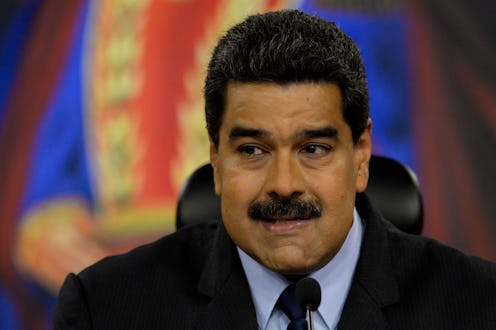
On Sunday evening, the Trump administration announced a new travel ban, placing limitations on travel to the United States for residents of eight countries. Trump's new travel ban imposes restrictions on three countries that were not a part of his first or second travel bans — including Venezuela. Notably, many people on social media are wondering why exactly Trump included Venezuela in his newest travel ban.
There are likely several reasons why Venezuela is a part of the newest version of the travel ban which, notably, restricts the travel of some Venezuelan government officials and their families, but not all Venezuelans. First, as indicated in a White House statement released on Sunday, the Trump administration believes that Venezuelan security standards (and the security standards of all countries delineated in the ban) are not sufficient for some Venezuelans to enter the United States. The statement described how the Department of Homeland Security had recently developed new travel vetting standards that it believes are more rigorous in nature.
The Department of Homeland Security, in cooperation with other executive departments and agencies, developed the new baseline requirements ... regarding the minimum information the United States needs to validate traveler identities, prevent fraud, and ensure individuals do not represent a national security or public-safety threat.
The statement then noted that countries were given 50 days to work with the United States to meet these new standards, but that several countries did not comply.
Countries that do not adequately adhere to the new requirements include Chad, Iran, Libya, North Korea, Syria, Venezuela, and Yemen. ... Accordingly, the Secretary of Homeland Security has recommended, and the President has approved, tailored travel restrictions to keep our country safe and encourage [these] countries to meet our baseline requirements.
In a fact sheet on its website, the U.S. government further expounded on its reasons for specifically including each country in the new travel ban. In regards to Venezuela, the administration highlighted what it believes are the Venezuelan government's shortcomings.
The government in Venezuela is uncooperative in verifying whether its citizens pose national security or public-safety threats; fails to share public-safety and terrorism-related information adequately; and has been assessed to be not fully cooperative with respect to receiving its nationals subject to final orders of removal from the United States. Accordingly, the entry into the United States of certain Venezuelan government officials and their immediate family members ... is suspended.
In addition to reportedly believing that Venezuelan security vetting standards are do not sufficiently meet newly-established American protocols, the ban on Venezuela could also perhaps stem at least partially from U.S. frustration with the country and its government — which the U.S. believes is on a path toward authoritarianism and causing substantial economic hardship for its citizens.
As Reuters reported, the travel ban for Venezuela is solely focused on Venezuelan government officials and their families — officials whom the U.S. reportedly blames for the country's massive economic hardships, which has resulted in extreme turmoil for its citizens. Indeed, the Trump administration's frustration with the country's leadership was evident in a recent meeting with Latin American leaders at the U.N., where Trump criticized Venezuela's government and called for a restoration of democracy in the country.
Moreover, in a recent speech to the U.N. General Assembly, Trump noted that the U.S was "prepared to take further action if the government of Venezuela persists on its path to impose authoritarian rule on the Venezuelan people." However, Trump did not describe what further action would entail.
Thus, overall, the Trump administration officially noted that it had decided to ban Venezuelan government officials from entering the United States because it believes that Venezuelan security protocols for vetting travelers are not acceptable. However, some likely believe the ban on Venezuela — especially since it singles out government officials — is also at least partially driven by the administration's growing frustration with Venezuela's government and its role in the country's socioeconomic crisis.
Many will likely be keenly observing how Venezuela responds to these new restrictions — and how the Trump administration reacts in turn.